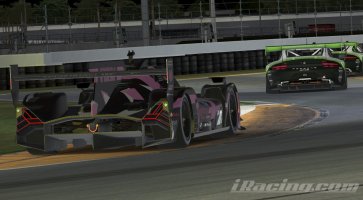Scott Mclaughlin credited iRacing for his win in the Sebring 12 Hours this weekend. This got me thinking, what skills are transferable from simracing to motorsport?
Image Credit: iRacing.com
This Super Sebring weekend saw an accumulation of amazing races taking place at the old airfield race track. None more so however than the headlining IMSA Sebring 12 Hours. Whilst the top class had its fair share of thrills and spills, the LMP2 category got a new, first-time class winner in the shape Scott McLaughlin.
More traditionally seen in Australian Supercars and, more recently, the Indycar championship, he has adapted very well to the unique challenges of endurance sportscar racing. In just his second race, the New Zealander claimed a class win and finished on the overall podium. After the event, he took to Twitter to credit iRacing for his win.
In the tweet, the three-time Supercars champion explained that the iRacing IMSA series helped him get up to speed for the real thing. Getting used to dealing with traffic is no small feat, with countless top level racers struggling with this unique part of motorsport. "The traffic patterns are so similar," he claims. He even goes as far as to recommend that young, up and coming racing drivers should use the game as a tool to practice for racing through traffic.
Personally, I would suggest that learning a track is the most applicable skill that can be taken from the sim and used come race day. Even the most prominent F1 drivers use simulators to learn new venues. That would certainly come in handy the first time the grid raced at the latest track, the Jeddah Corniche circuit. With a track all about getting into a rhythm and winding through the barriers at break-neck speeds, using a sim to learn the flow before arriving on-site would have been crucial.
What do you think are some of the most transferable skills form simracing to real motorsport?
Image Credit: iRacing.com
This Super Sebring weekend saw an accumulation of amazing races taking place at the old airfield race track. None more so however than the headlining IMSA Sebring 12 Hours. Whilst the top class had its fair share of thrills and spills, the LMP2 category got a new, first-time class winner in the shape Scott McLaughlin.
More traditionally seen in Australian Supercars and, more recently, the Indycar championship, he has adapted very well to the unique challenges of endurance sportscar racing. In just his second race, the New Zealander claimed a class win and finished on the overall podium. After the event, he took to Twitter to credit iRacing for his win.
In the tweet, the three-time Supercars champion explained that the iRacing IMSA series helped him get up to speed for the real thing. Getting used to dealing with traffic is no small feat, with countless top level racers struggling with this unique part of motorsport. "The traffic patterns are so similar," he claims. He even goes as far as to recommend that young, up and coming racing drivers should use the game as a tool to practice for racing through traffic.
The most transferable skills from simracing to motorsport
This all got me thinking about just how transferable the act of simracing is to real-world motorsport. Sure the seat of the pants sensation one gets from sitting behind the wheel of a real car is missing from simracing. And sure, every game has its own approach to what driving feels like. But the rest of the racing experience from race craft to strategy and even something as simple as racing lines can all be applied to the real world.Personally, I would suggest that learning a track is the most applicable skill that can be taken from the sim and used come race day. Even the most prominent F1 drivers use simulators to learn new venues. That would certainly come in handy the first time the grid raced at the latest track, the Jeddah Corniche circuit. With a track all about getting into a rhythm and winding through the barriers at break-neck speeds, using a sim to learn the flow before arriving on-site would have been crucial.
What do you think are some of the most transferable skills form simracing to real motorsport?

